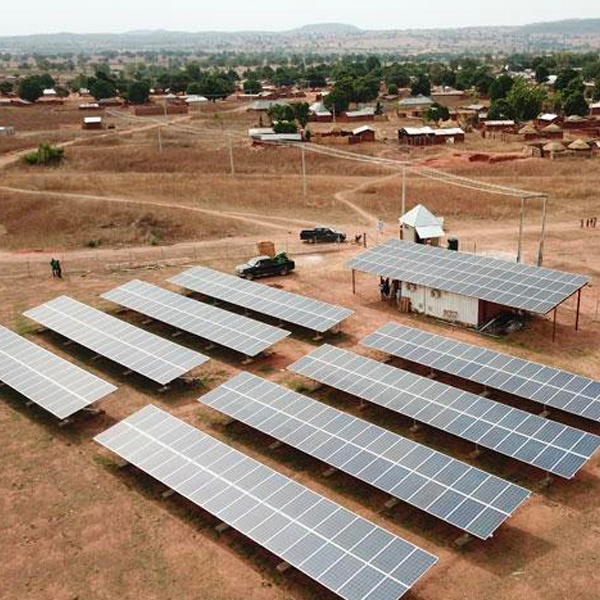Loss Localization in the Distribution Grid through Topology

Electric grids are central to climate change and adaptation and must shoulder new burdens, delivering energy from intermittent and distributed sources to meet growing demand. This challenge will be particularly acute for grids in low- and middle-income countries (LMICs), where per capita energy consumption is forecasted to grow dramatically but resources to develop and maintain grid infrastructure are limited. Detecting and targeting sources of loss and system weakness in the distribution grid, such as faulty transformers, overloaded lines, and malfunctioning regulating equipment, is critical for efficient grid operation. However, the distribution grid in LMICs is a vast, essentially un-sensed infrastructure; problems go long unnoticed and undiagnosed, leading to costly inefficiencies with human and environmental consequences. Existing approaches to detecting sources of loss in the distribution grid require sensing systems that would take decades to enable at scale and are prohibitively expensive in LMICs. In collaboration with nLine Inc., this project proposes an alternative: a low- cost, flexible framework that couples voltage sensing at subsampled customer connections with machine learning algorithms to estimate grid topology and localize losses in distribution networks. This work is funded by the Climate Change AI Innovation Grants Program.
Community-Based Approaches for Mini-grid Demand Assessment in the Fiji Islands

Mini grids are often designed to be financially viable once operational, thus contingent on the premise that they will provide affordable electricity services that their customers will fully utilize. Mini-grid design determines critical project parameters such as component sizing and network design which have a significant impact on system finances and subsequently the cost of energy required to make these systems economically viable. Therefore, they require accurate predictions of consumption profiles to yield meaningful designs – both oversized and undersized systems are undesirable and impact the sustainability of the systems.
In collaboration with the Laboratory for Energy and Power Solutions (LEAPS) at Arizona State University, the first phase of this project aims to evaluate a novel way to capture the electricity needs of an unelectrified communities in the Fiji Islands against the status quo approaches. We will evaluate a novel approach, the Community Energy Toolkit (COMET), a role-playing software tool built around a representation of a mini-grid system, intended to be used as an educational and collaborative planning tool in designing a community-sized mini-grid system against the status quo approaches of energy use and willingness to pay surveys.
Community-led Energy Development and Planning

This project proposes a new theory of change that embeds rural energy development in existing social frameworks and fabrics to support organizational innovations and co-development of solutions that ground community energy systems in local capacity and accrue local benefits. It proposes to center societal outcomes and benefits as a core component of co-designing transdisciplinary solutions by centering local knowledge, social frameworks, and stakeholder engagement in designing sustainable community energy systems in East Africa. It is currently in its seed phase and is a collaboration with the University of Minnesota - Twin Cities, Dartmouth College, Makerere University Business School, The Africa Research and Impact Network and Community Connect.
Transport Energy Transitions in Africa

In emerging economies like those in Africa, the transition to EVs will be far less straightforward and will look different from rich country transitions. Developing sustainable, inclusive, accessible and low-carbon mobility pathways for African countries involves many dimensions, and a harder look at EVs in relation to the continent’s power sector and development and climate goals. This project utilizes a data-driven approach to evaluate vehicle electrification pathways for urban cities in Africa, considering different vehicle fleet types, the unique local transportation culture and mobility patterns, and the constraints of the distribution grid. This project is a collaboration with the University of Massachusetts Amherst and WRI Africa.
Urban Energy Access

With rapid population growth and rural to urban migration, cities in developing regions will play a crucial role in economic growth and in meeting their energy transition targets. For the urban energy transition in sub-Saharan Africa to be just and equitable, it has to account for the urban poor, who currently comprise 50 - 60% of the urban population in the fast-urbanizing region. The urban poor often rely on the informal economy, live in overcrowded settlements, have poor housing quality, and have limited access to essential social services. Further, they face persistent inequities in the accessibility, reliability, quality, safety, and affordability of electricity service. This project explores the challenges faced by informal communities in Kampala in obtaining a safe, legal, affordable, and reliable electrical connection. Further explores the electricity infrustructure barriers (pertaining to the safety, quality, and reliability of the power) to the energy transition among the urban poor, especially the shift in patterns of cooking fuel use. This project is part of the Spotlight Kampala Initiative.
Past Projects
Text
This is bold and this is strong. This is italic and this is emphasized.
This is superscript text and this is subscript text.
This is underlined and this is code: for (;;) { ... }.
Finally, this is a link.
Heading Level 2
Heading Level 3
Heading Level 4
Nunc lacinia ante nunc ac lobortis. Interdum adipiscing gravida odio porttitor sem non mi integer non faucibus ornare mi ut ante amet placerat aliquet. Volutpat eu sed ante lacinia sapien lorem accumsan varius montes viverra nibh in adipiscing blandit tempus accumsan.
Lists
Unordered
- Dolor etiam magna etiam.
- Sagittis lorem eleifend.
- Felis dolore viverra.
Alternate
- Dolor etiam magna etiam.
- Sagittis lorem eleifend.
- Felis feugiat viverra.
Definition
- Item1
-
Lorem ipsum dolor vestibulum ante ipsum primis in faucibus vestibulum. Blandit adipiscing eu felis iaculis volutpat ac adipiscing accumsan eu faucibus. Integer ac pellentesque praesent. Lorem ipsum dolor.
- Item2
-
Lorem ipsum dolor vestibulum ante ipsum primis in faucibus vestibulum. Blandit adipiscing eu felis iaculis volutpat ac adipiscing accumsan eu faucibus. Integer ac pellentesque praesent. Lorem ipsum dolor.
- Item3
-
Lorem ipsum dolor vestibulum ante ipsum primis in faucibus vestibulum. Blandit adipiscing eu felis iaculis volutpat ac adipiscing accumsan eu faucibus. Integer ac pellentesque praesent. Lorem ipsum dolor.
Actions
Pagination
Blockquote
Lorem ipsum dolor vestibulum ante ipsum primis in faucibus vestibulum. Blandit adipiscing eu felis iaculis volutpat ac adipiscing accumsan eu faucibus. Integer ac pellentesque praesent. Lorem ipsum dolor. Lorem ipsum dolor vestibulum ante ipsum primis in faucibus vestibulum. Blandit adipiscing eu felis iaculis volutpat ac adipiscing accumsan eu faucibus.
Table
Default
| Name | Description | Price |
|---|---|---|
| Item1 | Ante turpis integer aliquet porttitor. | 29.99 |
| Item2 | Vis ac commodo adipiscing arcu aliquet. | 19.99 |
| Item3 | Morbi faucibus arcu accumsan lorem. | 29.99 |
| Item4 | Vitae integer tempus condimentum. | 19.99 |
| Item5 | Ante turpis integer aliquet porttitor. | 29.99 |
| 100.00 | ||
Alternate
| Name | Description | Price |
|---|---|---|
| Item1 | Ante turpis integer aliquet porttitor. | 29.99 |
| Item2 | Vis ac commodo adipiscing arcu aliquet. | 19.99 |
| Item3 | Morbi faucibus arcu accumsan lorem. | 29.99 |
| Item4 | Vitae integer tempus condimentum. | 19.99 |
| Item5 | Ante turpis integer aliquet porttitor. | 29.99 |
| 100.00 | ||
Buttons
Form
Image
Fit










Left & Right
 Lorem ipsum dolor sit accumsan interdum nisi, quis tincidunt felis sagittis eget. tempus euismod. Vestibulum ante ipsum primis in faucibus vestibulum. Blandit adipiscing eu felis iaculis volutpat ac adipiscing accumsan eu faucibus. Integer ac pellentesque praesent tincidunt felis sagittis eget. tempus euismod. Vestibulum ante ipsum primis sagittis eget. tempus euismod. Vestibulum ante ipsum primis in faucibus vestibulum. Blandit adipiscing eu felis iaculis volutpat ac adipiscing accumsan eu faucibus. Integer ac pellentesque praesent.
Lorem ipsum dolor sit accumsan interdum nisi, quis tincidunt felis sagittis eget. tempus euismod. Vestibulum ante ipsum primis in faucibus vestibulum. Blandit adipiscing eu felis iaculis volutpat ac adipiscing accumsan eu faucibus. Integer ac pellentesque praesent tincidunt felis sagittis eget. tempus euismod. Vestibulum ante ipsum primis sagittis eget. tempus euismod. Vestibulum ante ipsum primis in faucibus vestibulum. Blandit adipiscing eu felis iaculis volutpat ac adipiscing accumsan eu faucibus. Integer ac pellentesque praesent.
 Lorem ipsum dolor sit accumsan interdum nisi, quis tincidunt felis sagittis eget. tempus euismod. Vestibulum ante ipsum primis in faucibus vestibulum. Blandit adipiscing eu felis iaculis volutpat ac adipiscing accumsan eu faucibus. Integer ac pellentesque praesent tincidunt felis sagittis eget. tempus euismod. Vestibulum ante ipsum primis sagittis eget. tempus euismod. Vestibulum ante ipsum primis in faucibus vestibulum. Blandit adipiscing eu felis iaculis volutpat ac adipiscing accumsan eu faucibus. Integer ac pellentesque praesent.
Lorem ipsum dolor sit accumsan interdum nisi, quis tincidunt felis sagittis eget. tempus euismod. Vestibulum ante ipsum primis in faucibus vestibulum. Blandit adipiscing eu felis iaculis volutpat ac adipiscing accumsan eu faucibus. Integer ac pellentesque praesent tincidunt felis sagittis eget. tempus euismod. Vestibulum ante ipsum primis sagittis eget. tempus euismod. Vestibulum ante ipsum primis in faucibus vestibulum. Blandit adipiscing eu felis iaculis volutpat ac adipiscing accumsan eu faucibus. Integer ac pellentesque praesent.
Box
Felis sagittis eget tempus primis in faucibus vestibulum. Blandit adipiscing eu felis iaculis volutpat ac adipiscing accumsan eu faucibus. Integer ac pellentesque praesent tincidunt felis sagittis eget. tempus euismod. Magna sed etiam ante ipsum primis in faucibus vestibulum.
Preformatted
i = 0;
while (!deck.isInOrder()) {
print 'Iteration ' + i;
deck.shuffle();
i++;
}
print 'It took ' + i + ' iterations to sort the deck.';